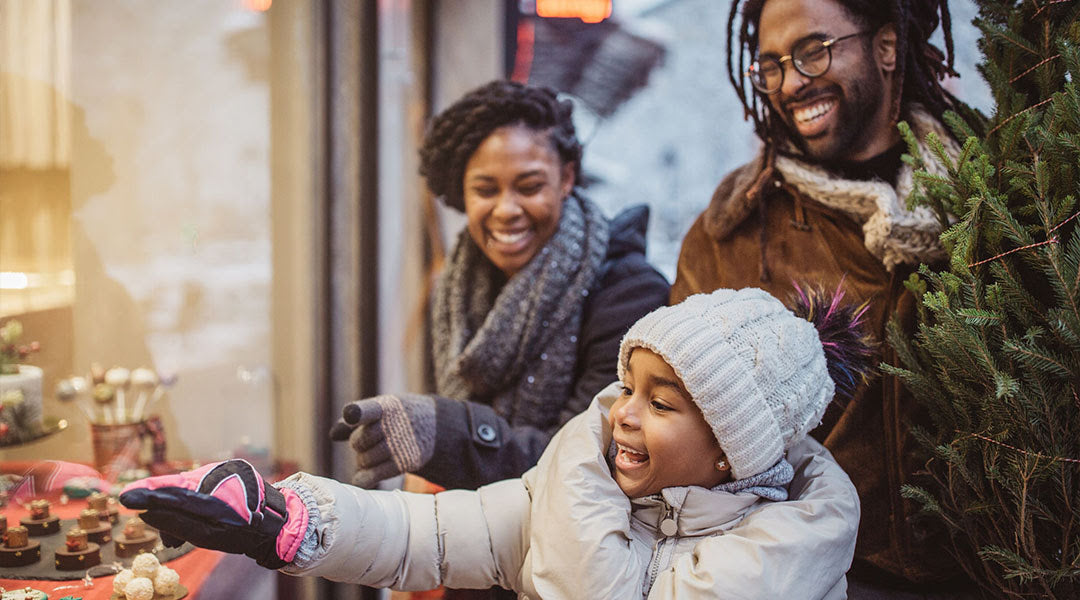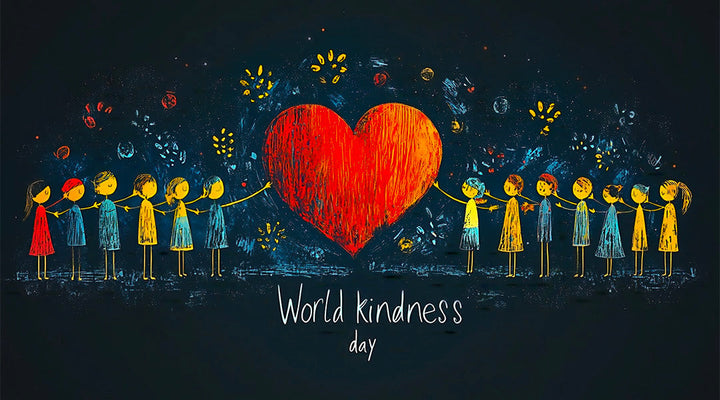
Tis The Season Of Celebration - Exploring A Wealth Of Love And Tradition Found In Happy Winter Holidays
Happy Holidays!
A warm sentiment, but what does it mean?
Many people celebrate Thanksgiving, Christmas, and New Year’s (Eve and Day), but the winter months house multiple holidays, and each of these come with their own unique meanings, celebrations, and traditions.
If you celebrate Thanksgiving, each year on the fourth Thursday of November you likely gather with friends, family, and other loved ones to enjoy a feast of turkey, stuffing, traditional side dishes, pumpkin themed desserts, and then some…
Perhaps you can recall many Thanksgivings where you’ve helped your mom or grandma in the kitchen, or maybe your family watches (or plays) a game of football in between naps and feasting on this warm day of giving thanks.
Then, if you celebrate Christmas, this single day commemorating the birth of Christ prompts celebrations all throughout the month of December which likely include decorations, evergreen trees, mistletoe, cookie-baking, candy-making, gift-giving, and again, time spent with those you love most.
And, if you’re like most Americans, you probably grew up learning of these two holidays (in particular) as traditional, common celebrations. But, what about the other special days, the other holidays celebrated within the winter months by many Americans and multitudes all around the world?
Granted, I grew up in a very small, rural town, but I don’t remember learning of, or even hearing of, the many holidays that are celebrated throughout this same season we widely recognize as the holiday season.
So, to truly wish each and every one of you Happy Holidays, we’d like to highlight several days celebrated all throughout the world in the winter months, including what makes these days so special to so many.
I hope you’ll join me in preparing a delicious cup of coffee to sip and savor as we journey through many miles, meanings, and memorable traditions for an expanded celebration of this incredible holiday season.
Holiday Celebrations, Family History, & Strengthening Bonds

Before we explore a few individual holidays, I want to take a brief look at why these special days are so…well…special.
Holidays, celebrations, and traditions, whether we realize it or not, these days and the activities we associate with them can play a big role in who we are as people.
Many holidays have a religious connection, whether Christian, Jewish, Buddhist, Hindu, etc., and such commemorations of faith remind followers of the principles they espouse - principles like goodness, kindness, generosity, humility, and benevolence.
These holidays and others, those with and without a religious connection, simply afford folks time to spend with family, friends, and loved ones celebrating and participating in fond traditions.
And, while such times may seem routine, even taken for granted, these gatherings can truly build and foster bonds within relationships.
In fact, the traditions we often take part in as we celebrate holidays play an important role in building bonds within a family unit or any given community.
Holidays bring with them a sense of belonging, they can provide opportunities for expressing oneself, and they even allow us to learn of family history, celebrating those who came before us through time-honored traditions.
One Harvard publication states the importance of holiday celebrations and traditions in the following way: “Rituals are central to family life. Despite variation in form, family rituals, and practice…holidays serve to create and reinforce family identity, the family’s subjective sense of its own continuity and its distinct character.”
So then, with a prevailing sense of connection, warmth, and kindness which spans across nearly all holidays and traditions, let’s explore the following special days, learning and celebrating together.
A Season Of Celebration
The following ten holidays are celebrated at various times throughout November, December and January. Some span across countries and cultures, and others are specific to region, religion, or race.
What I love about each of these holidays though is the overarching theme of celebration, remembrance, warmth, and connection. May you feel and experience these same sentiments as you read about each one and as you celebrate with those dear to you.
Diwali (November 12)

Diwali, or Dipawali, is one of India’s most important holidays, and one which prompts great celebration.
This holiday generally occurs sometime between October and November, and its date changes annually depending on the position of the moon.
In 2023, Diwali began on November 12, and in true celebratory fashion and Indian tradition, the festivities for this holiday lasted approximately 5 days.
While each Indian region has developed different, distinct, traditions surrounding the observance of the day, the meaning behind the holiday remains true across miles: this day represents the triumph of good over evil and light over darkness.
The meaning behind Diwali is seen in the use of light in its celebration. In fact, another name for this holiday is the Festival of Lights, as a traditional method of observance involves lighting a row of clay lamps outside of one’s home, symbolizing the inner light that protects from spiritual darkness.
Throughout the 5 day long celebration, it is common for people to commemorate the holiday by observing the following practices:
- On day 1, people clean their homes and shop for gold to bring good fortune into their homes.
- On day 2, homes are decorated with clay lamps, and patterns or designs known as rangoli are made with colored powders or sand on the floor.
- Day 3 is the main day of the festival where families gather to pray, feast, and enjoy fireworks.
- Day 4 of Diwali is marked as the beginning of a new year, and friends and loved ones typically visit, bringing gifts and well wishes for the year ahead.
- And, on day 5, brothers typically visit their married sisters, bringing them gifts and warm wishes for the season.
Diwali has become a national festival, with Hindus, Sikhs, Jains, and even some Buddhists taking part in the celebrations.
Saint Nicholas Day (December 6)

Saint Nicholas was the patron saint of Russia and Greece most noted for his spirit of kindness and generosity.
After the Protestant Reformation, Saint Nicholas is said to have been forgotten by many religious Europeans (particularly protestant Christians). However, Holland is credited with keeping his memory and spirit alive, celebrating Saint Nicholas Day, or feast day, on the day of Nicholas’ death, the man now known in these regions as Sinterklaas.
It was here, in Holland, that legend describes St. Nicholas’ benevolent acts of distributing sweets and gifts to ‘good’ children, dressed in a bishop’s red robe.
St. Nicholas was known to sell off his possessions, enabling him to give to the poor and ill. Therefore, this day is commemorated (primarily in the Netherlands, Belgium, and Luxembourg) by giving small gifts and food items.
Bodhi Day (December 8)
Bodhi Day is a traditional Buddhist holiday. Annually celebrated on December 8th, this day honors the time when Siddhartha Gautama achieved enlightenment through meditation.
Siddhartha Gautama is known as the founder of Buddhism, otherwise known as the Buddha.
It is believed that Gautama left a life of luxury for one of simplicity. In this journey, many acknowledge that “Siddhartha resolved to sit beneath a Bodhi tree and meditate until he found the root of suffering and how to relieve himself from it.”
Buddhists celebrate this awakening, this enlightening, not through pomp and circumstance, not through parades, festivities, and fanfare, but instead by quietly, meekly learning more about Buddhism, specifically through meditation.
On Bodhi Day, many Buddhists enjoy tea and cookies. Some decorate a Bodhi tree. Others light candles or lights to commemorate the enlightenment. But, most dedicate the day to faithful meditation.
Hanukkah (December 7-15 2023)
Hanukkah is a Jewish holiday spanning over 8 days, typically in the month of December. The dates of celebration annually change based on the solar calendar, but this year (2023), celebrations will take place December 7-15.
Hanukkah is described as a holiday of praise and thanksgiving, remembering the rededication of the Temple in Jerusalem and the miracle of a single cruse of oil lasting 8 nights.
Hanukkah is also known as the Festival of Lights, a symbol of spiritual freedom.
It is often a celebration observed through in-home customs and honorings, including the incorporation of special holiday foods, games, and songs.
Likely the most familiar commemoration of this holiday is the traditional lighting of the hanukkiyah or the Hanukkah menorah, an eight-branched candelabrum.
The lighting of the menorah begins softly with one candle, then the light grows each passing night as another light (lit-candle) is added.
In some Jewish homes, blessings are recited each night of celebration, jelly doughnuts (or sufganiyot) and potato pancakes (latkes) are enjoyed, and a game with a four-sided spinning top (dreidel) is played in celebration of the holiday.
Saint Lucia Day (December 13)

The festival of Saint Lucia, or nicknamed similar to a few other holidays, the Festival of Lights, is traditionally celebrated on December 13.
Also known as Lussinatta, or the feast of Saint Lucy, this holiday is generally celebrated in Sweden, Denmark, Finland, and in some parts of Italy, Croatia, and surrounding areas.
Saint Lucia Day commemorates the beginning of the Christmas season, honoring Lucia, whose name means light.
Lucia was martyred for her Christian faith, and this holiday specifically remembers her light and her faith, even unto death.
Traditional observances of Saint Lucia often center around the theme of service and light, as Lucia was known for these qualities.
Today, as part of Lussinatta celebrations, young girls often dress in white and wear candle-lit wreaths on their heads as they serve their families traditional festival foods.
In keeping with the theme of light, Saint Lucia Day, particularly in Sweden, marks the soon-coming end of long winter nights and darkness, a time which gives way to the light of warmer months/seasons.
Winter Solstice (December 21)
Winter Solstice is generally celebrated on December 21, and it honors the changing of the seasons.
This holiday is often considered an ancient pagan tradition, one that celebrates nature and welcomes the changing of the seasons with intention. Some even practice a tradition of setting their intentions for the coming year and season on this day.
You may recognize a few winter solstice traditions as they’ve since been adopted as common Christmastime practices for many families all throughout the holiday season.
Yule logs burning in the fireplace, the hanging of evergreen wreaths, yule altars which consist of silver, gold, or yellow hued lit candles, and evergreen trees which are brought into the home for the season (including decorations on some)…do any of these decorations and traditions sound familiar?
Yes, many of the typical winter holiday favorites, even Christmas celebration favorites, have long been a part of winter solstice traditions.
Boxing Day (December 26)

Boxing Day falls on the day after Christmas. Dating back to the reign of Queen Victoria, in the 1800’s, Boxing Day was incorporated as a day which guaranteed British workers and servants were given a needed day off, a break from their tireless work.
In its original celebration, upper class Britons were said to give workers/servants a gift, or present, in conjunction with this day off of work.
Today, this holiday has evolved to include a more commercial slant, now being a day of gift giving. And, since it’s a public holiday, with folks off of work and children out of school, many families celebrate by going shopping for those wanted/needed gifts, attending sporting events, gathering for meals of baked ham, pease pudding, and mince meat pies, or simply relaxing at home.
Kwanzaa (December 26 - January 1)
Kwanzaa is a fairly new holiday, created in 1966 by the professor and chair of African American Studies at California State University, Maulana Karenga.
Karenga created this holiday as a way to honor African American culture and bring the African American community together.
Meant to honor family, community, and culture, the days of Kwanzaa are spent in celebration, combining multiple traditional and historic African celebrations.
There are seven principles or symbols followed as Kwanzaa is celebrated - unity, self-determination, collective work and responsibility, cooperative economics, purpose, creativity, and faith.
On the 6th day of Kwanzaa the traditional Karamu feast is held which combines many African harvest celebrations.
And, while many have thought Kwanzaa to be an alternative to Christmas celebrations, the holiday doesn’t have to be religious in nature. In fact, folks from any faith or walk of life can join in to honor the culture celebrated through Kwanzaa.
Genna (January 7)

Genna, or Ganna, is essentially Christmas, however in Ethiopia (specifically the Ethiopian Orthodox Church) the Julian calendar is used, placing Christmas celebrations on January 7th, instead of December 25th as is recognized in most western societies.
And, the date isn’t the only thing that differs from western regions in this Christmas celebration.
In observance of Ganna, Ethiopian christians typically go to church on Ganna, and many fast on the day before Ganna. And, some reports indicate devout Ethiopian observers of the holiday will even fast for 43 days leading up to Genna.
At dawn, or otherwise known as the Ethiopian Christmas morning, people dress in white and wear a traditional garment called a shamma, a thin piece of white cloth with brightly colored stripes on the end.
Ganna services typically begin around 4:00 am, and here celebrations include choirs singing familiar songs. Those in attendance are also traditionally given a lit candle which they will hold as they walk in circular procession as part of the service.
At home, in a more relaxed observance of the day, men are sometimes known to play a hockey-type game which is also referred to as Ganna.
Makar Sankranti (January 14/15)
Makar Sankranti is a Hindu holiday which centers around significant movement in the zodiac, with observers ultimately believing that our life is sustained and nourished by this movement.
On this holiday each year, people are reminded of what we are because of our planet as well as what we take from our planet to exist and grow.
This holiday also centers around a time of harvest, even sometimes referred to as the harvest festival.
On Makar Sankranti, those who assist in harvesting are honored, and the day after the holiday, named Mattu Pongal, the farm animals that have taken part in the harvest are honored as well. And, in some celebrations, the sun god is specifically honored.
Since these observances center around a time of harvest, it is also customary to welcome a fresh beginning for the seasons to come, prompting celebrations to include a commitment to “new and fresh efforts in spiritual processes.”
Check out Lifeboost Coffee Gifts Box.

Becky is a mother, educator, and content writer for Lifeboost Coffee. She has had three years’ experience as a writer, and in that time she has enjoyed creatively composing articles and ebooks covering the topics of coffee, health and fitness, education, recipes, and relationships.
- https://portal.clubrunner.ca/3250/stories/winter-holidays-around-the-world
- https://time.com/6242283/december-global-holidays-christmas-hanukkah-yule/
- https://blog.remitly.com/lifestyle-culture/winter-holidays/
- https://www.hbs.edu/ris/Publication
- https://www.linkedin.com/pulse/why-holiday-traditions-might-more-important-than-you-think-walter
- https://www.sunset.com/lifestyle/wellness/winter-solstice-rituals-nature
- https://www.nationaldaycalendar.com/december/bodhi-day-december-8
- https://thehill.com/homenews/nexstar_media_wire/3776663-why-hanukkah-starts-on-a-different-day-every-year/
- https://www.myjewishlearning.com/article/hanukkah-at-home/
- https://www.britannica.com/topic/Saint-Nicholas-Day
- https://nmaahc.si.edu/explore/initiatives/kwanzaa
- https://www.nbcwashington.com/entertainment/holidays/what-is-boxing-day-and-why-is-it-celebrated/3237320/
- https://www.bbcgoodfood.com/howto/guide/what-is-diwali-and-how-is-it-celebrated
- https://kids.nationalgeographic.com/pages/article/diwali
- https://www.rmg.co.uk/stories/topics/when-diwali
- https://gustavus.edu/events/stlucia/legend.php
- https://kaett.com/en/etiopia/festivals-and-holidays/navidad-de-etiopia-gena/
- https://isha.sadhguru.org/us/en/wisdom/article/makar-sankranti-significance-and-benefits-of-festival
- References for the article to confirm data and information.










